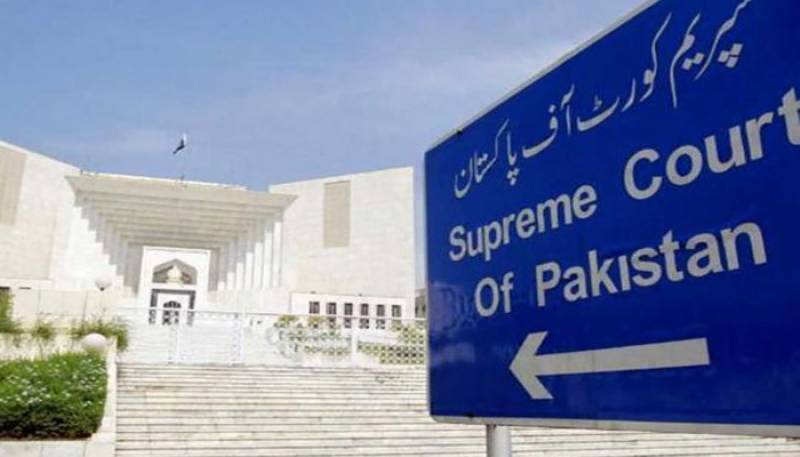Islamabad (Web Desk): An eight-member bench of the top court on Thursday started hearing the petitions challenging the Supreme Court (Practice and Procedure) Bill 2023 that aims to curtail the chief justice's powers, including those related to suo motu and formation of benches.
The bench is headed by Chief Justice of Pakistan (CJP) Umar Ata Bandial and comprises Justice Ijaz ul Ahsan, Justice Munib Akhtar, Justice Sayyed Mazahar Ali Akbar Naqvi, Justice Muhammad Ali Mazhar, Justice Ayesha Malik, Justice Syed Hasan Azhar Rizvi and Justice Shahid Waheed.
Meanwhile, the coalition parties, in a joint statement ahead of the hearing slammed the move of constituting a bench before the completion of the legislative process and called it an attack on parliament.
Earlier, Pakistan Bar Council (PBC) Vice Chairman Haroonur Rashid and Executive Committee Vice Chairman Hassan Raza Pasha, said that the chief justice constituted the bench in haste for hearing the petitions.
They said that the lawyers’ community would boycott the court proceedings across the country on Thursday.
Three separate petitions were filed by Raja Amer Khan, Chaudhry Ghulam Hussain and Mohammad Shafay Munir, among others, under Article 184(3) of the Constitution, asking the top court to set aside the bill.
Meanwhile, the bill has also been challenged in the Islamabad High Court (IHC) by lawyer Saeed Aftab in a separate plea.
At the outset of the hearing, the petitioner's lawyer Imtiaz Siddiqui started his arguments by saying that this case is very important in the prevailing situation.
He said that differences widened between the parties after the Qasim Suri case and the political crisis increased after the National Assembly was restored.
The lawyer said that the federal government and the Election Commission of Pakistan (ECP) are not willing to hold elections which is why the court had to take suo motu notice.
Imtiaz Siddiqui said that the problems were created following the court’s directives to implement the Constitution after which the judges and judiciary were criticised.
"The government's ministers and members of parliament are responsible for this," the petitioner's lawyer said, adding that the proposed legislation interfered with the independence of the judiciary.
He said that the president's objections to the bill were not examined. Siddiqui said that the bill will become law after the approval of a joint session of the parliament in 10 days.
Siddiqui said that the Supreme Court makes its own rules under Article 191.
The Joint Sitting of Parliament on Monday passed the Supreme Court (Practice and Procedure) Bill, 2023 amid protest by the Pakistan Tehreek-e-Insaf (PTI) lawmakers mostly belonging to upper house.
Last week President Dr Arif Alvi had returned the bill for reconsideration to the Parliament as per the provisions of Article 75 of the Constitution.
The bill, passed by both houses of the Parliament, aims to deprive the office of the chief justice of Pakistan (CJP) of powers to take suo motu notices in an individual capacity.
As per the government, the passed bill aims at giving the power of taking suo motu notice to a three-member committee comprising senior judges including the CJP.
It also aims to have transparent proceedings in the apex court and includes the right to appeal.
Regarding the constitution of benches, the bill states that every cause, matter or appeal before the apex court would be heard and disposed of by a bench constituted by a committee comprising the CJP and the two senior-most judges. It added that the decisions of the committee would be taken by a majority.
Regarding exercising the apex court’s original jurisdiction, the bill said that any matter invoking the use of Article 184(3) would first be placed before the above mentioned committee.
The bill says that if the committee is of the view that a question of public importance with reference to the enforcement of any of the fundamental rights conferred by Chapter I of Part II of the Constitution is involved, it shall constitute a bench comprising not less than three judges of the Supreme Court of Pakistan which may also include the members of the committee, for adjudication of the matter.
On matters where the interpretation of the Constitution is required, the bill said the above mentioned committee would compose a bench comprising no less than five apex court judges for the task.
Regarding appeals for any verdict by an apex court bench that exercised Article 184(3)‘s jurisdiction, the bill said that the appeal will lie within 30 days of the bench’s order to a larger Supreme Court bench. It added that the appeal would be fixed for hearing within a period not exceeding 14 days.
It added that this right of appeal would also extend retrospectively to those aggrieved persons against whom an order was made under Article 184(3) prior to the commencement of the Supreme Court (Practice and Procedure), Bill 2023, on the condition that the appeal was filed within 30 days of the act’s commencement.


